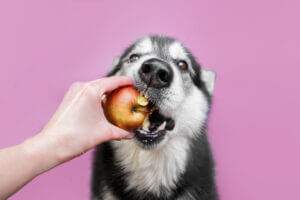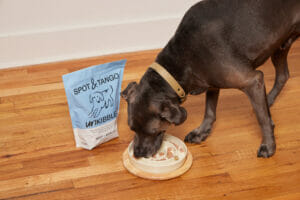January 11, 2022
Constipation is a common digestive problem in most pets, including dogs. Dog constipation simply means your pooch finds it challenging to poop or doesn’t have normal bowel movements on a regular schedule, which is usually one or two times a day.
Dog constipation can happen at any age, regardless of breed or lifestyle. Most cases are treated relatively easily, and sometimes they can recover pretty quickly without much help. However, it can lead to lethargy, loss of appetite, and vomiting when left untreated, leading to further health complications.
As a responsible pet parent, it’s vital to pay attention to what goes into your pet and what comes out (or doesn’t come out).
Dogs have sensitive digestive systems, and gastrointestinal problems can be a sign of an underlying health issue. While most pet parents worry about diarrhea, you also need to keep a vigilant eye on their pooping patterns, too.
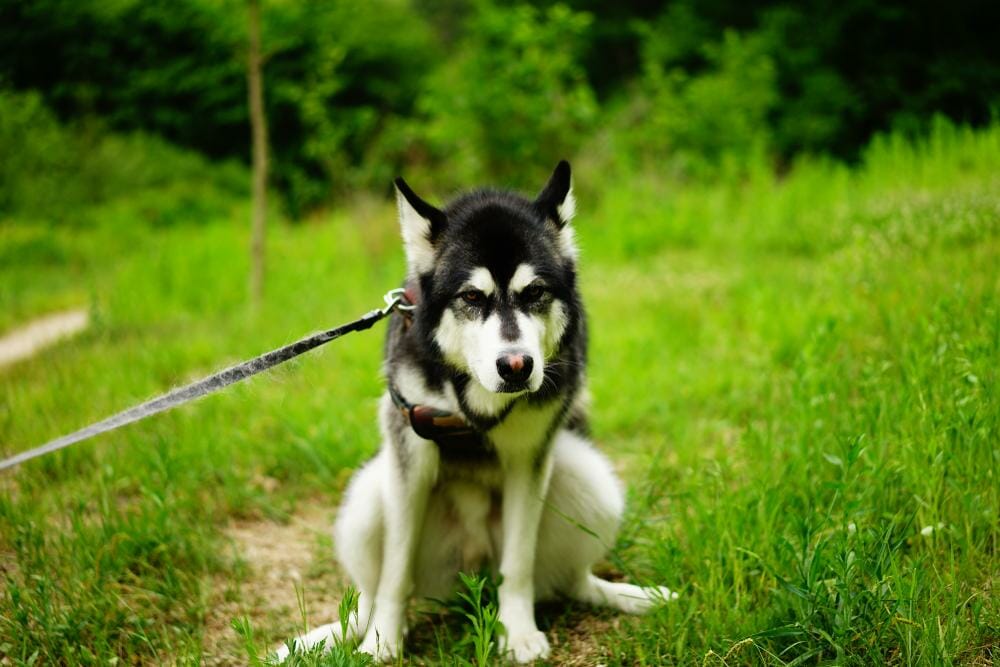
Follow this guide to learn about dog constipation symptoms, causes, and for more information on the best dog constipation remedy.
We’ll also explore some frequently asked questions, so you know what to give a dog for constipation. If your pet is struggling with constipation, giving them relief should be at the top of your priority list.
What are the Symptoms of Dog Constipation?
The most typical dog constipation symptoms include:
- Abnormal fecal matter
Dog constipation can lead to the evacuation of tiny, hard, and dry pebble-like stools. Small amounts of liquid, blood, or mucus may follow after attempts at defecation.
- Tenesmus
Your dog may feel the need to evacuate its bowels with little to no stool passed. They may attempt or strain to pass feces unsuccessfully several times. Tenesmus can be a transient or temporary problem related to constipation, and it can be intermittent or constant, usually accompanied by cramping, pain, and involuntary straining efforts.
- Painful defecation
Painful experiences when having a bowel movement can be a symptom of dog constipation. It’s medically referred to as dyschezia, and it can involve difficult defecation accompanied by swelling, redness, or soreness around the anus.
- Scooting
Your dog may scoot or drag their bottom along the ground when they’re constipated. This behavior may also be accompanied by excessive circling, frequent squatting, and crying out in severe cases, as they experience anal discomfort and try to relieve the pain.
- Appetite loss
Your dog may lose their appetite when they’re unable to have a bowel movement. It’s a sign of severe dog constipation and can lead to excessive weight loss.
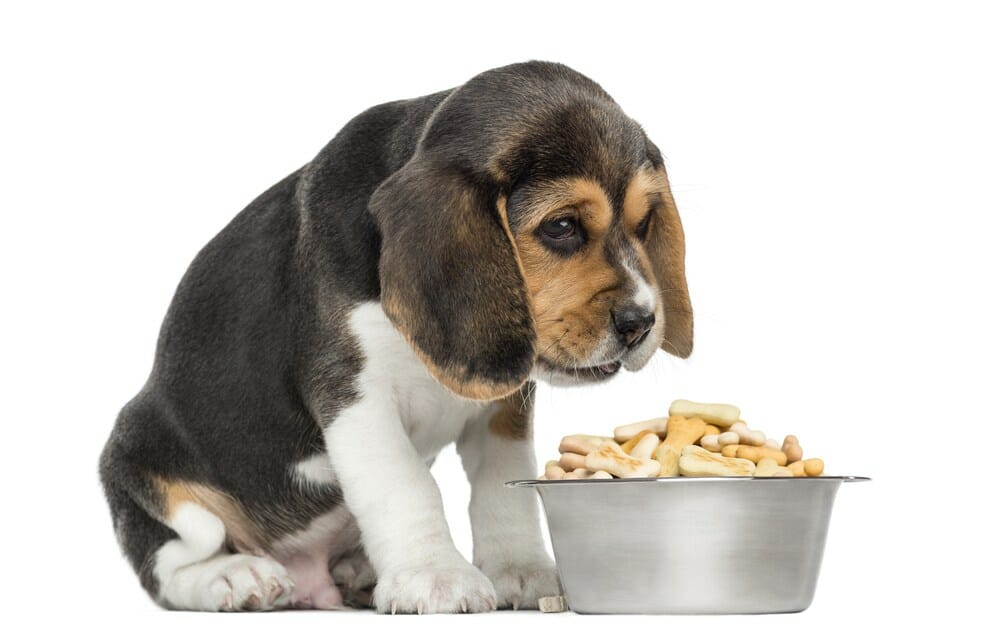
- Behavioral changes
Your dog’s behavior may change because of the discomfort caused by constipation. They may become more lazy or weak and sluggish with signs of depression and distress.
- Bloating
A bloated appearance is typical in constipated dogs. This will likely involve abdominal bloating and discomfort with a distended belly. The abdomen may be tense and painful, and your dog may growl or cry out if you press on their lower back or stomach.
- Vomiting
To try and relieve the pressure and discomfort of constipation, your dog may vomit intermittently or occasionally.
Some of these symptoms are mild, while others are severe and require immediate care. It’s not uncommon for some dogs to go a couple of days without a bowel movement.
Nonetheless, you should contact your veterinarian immediately if your dog has failed to have a bowel movement within 48 to 72 hours of their previous bowel movement.
What Causes Constipation in Dogs?
With normal digestion, your dog’s waste is full of electrolytes and water as it passes via the intestines to the colon. The colon mainly absorbs the water while the waste is pushed out as stool.
If anything slows or impairs this process, the fecal mass stalls in your dog’s colon and continues to lose water. As a result, it gets harder, dryer, and ultimately impossible to pass, resulting in constipation.
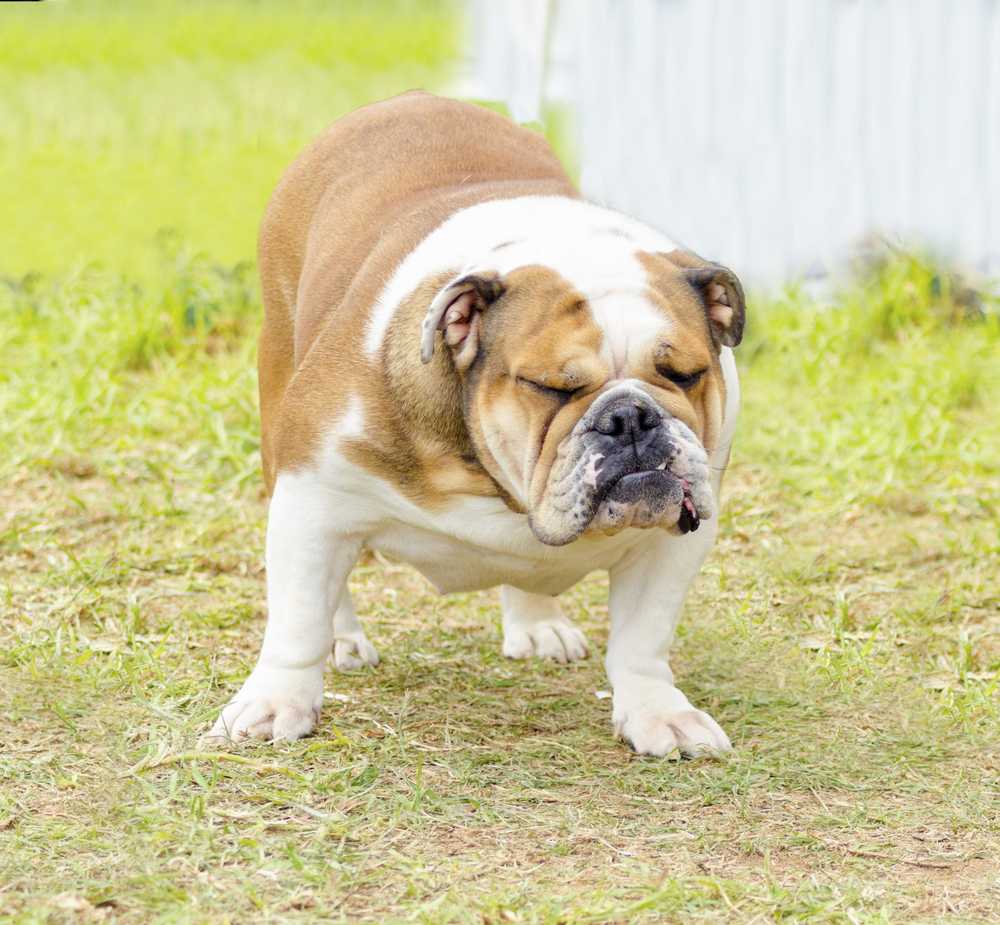
Numerous causes can contribute to dog constipation, with some as simple as inadequate exercise, to more complex issues like cancer. Vets categorize the causes depending on where the problem occurs along your dog’s digestive tract. They can include:
- Intraluminal causes – these refer to blockages within the colon.
- Extraluminal causes – these refer to obstructions occurring outside the colon like pelvic fractures or tumors.
- Intrinsic causes – these usually result from nerve injuries or diseases like cancer.
Common causes of dog constipation include:
- Diet
Just like in humans, a diet with excessive or too little fiber or water is usually the main culprit for dog constipation. It often results from low-quality dog foods or food not intended for dogs, like feeding your furry friend table scraps. Dietary calcium sources like bone meals or bones can also contribute to constipation. Additionally, dogs eat almost anything, even things that aren’t food, including indigestible objects like garbage, small rocks, gravel, and toys. These can impair or block the fecal transit process.
Feeding them good quality food void of poor-quality fillers and additives, such as Spot & Tango, is a step in the right direction towards a constipation-free lifestyle for your pet.
- Too much self-grooming
If your dog licks their fur excessively, they may ingest large amounts of hair that mixes with stools, making them difficult to pass, or creates fur balls that block the colon.
- Tumors
Tumors or masses in the digestive tract, including the colon, rectum, or anus, can cause an obstruction.
- Medication
Dog constipation can be a side effect of some medication, including drugs like diuretics, opiates, antihistamines, particular cancer drugs, and some antacids.
- Orthopedic conditions
Diseases or injuries that affect your dog’s musculoskeletal system can make it difficult for your dog to squat or cause pain as they try to get into a suitable defecting position.
- Metabolic conditions
Metabolic conditions refer to any disorder or disease that may affect their normal metabolism or the process of converting food to energy on a cellular level. Such conditions can result in a sluggish metabolism, which slows down the entire digestive process and causes constipation.
- Dehydration
Anything that causes dehydration, including illnesses and lack of enough water intake, can lead to constipation. The stool becomes too hard or painful to pass.
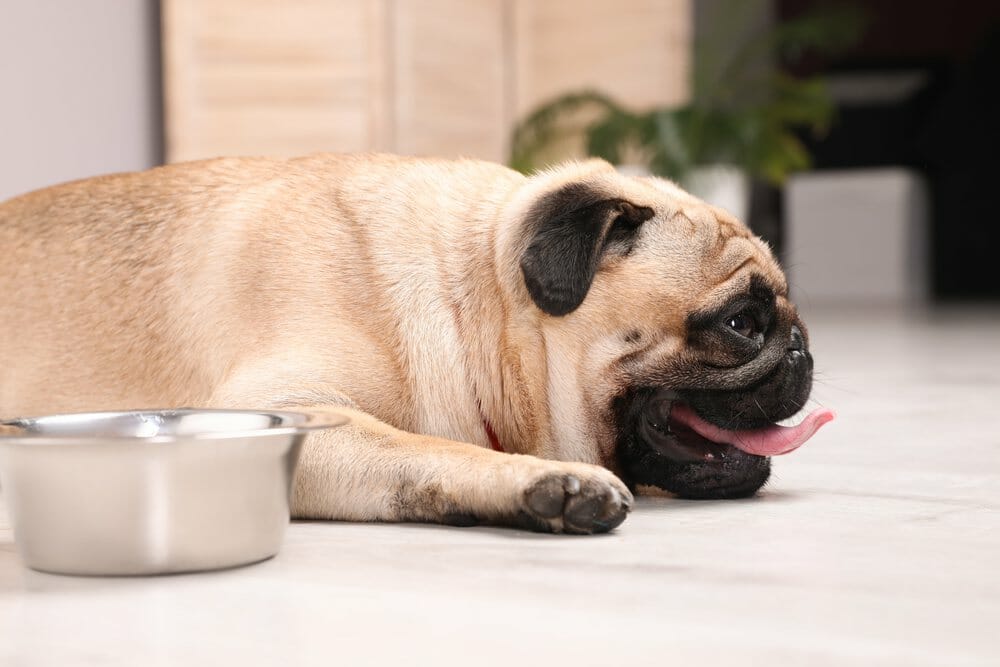
- Psychological problems and stress
If your dog is experiencing any psychological problems or stress in their environment, they may be sacred of defecating and may instead hold it in, resulting in constipation.
- Anal gland issues
Issues like an enlarged anal gland can make it difficult for your dog to go to the bathroom normally. A vet can help ensure your dog’s anal glands are regularly expressed. You shouldn’t try to do it at home by yourself unless a pro has shown you how to do it. The last thing you want is to traumatize yourself and your pet or cause them injury.
How Is Constipation In Dogs Treated?
When your dog is suffering from constipation, they need more of your care and attention. Here’s how to help a constipated dog:
1. Contact your vet
To be on the safe side, contact your vet and inform them that your dog has constipation. You’ll have to answer a few questions to determine whether a visit to the vet is necessary.

It’s a common issue, and you might be able to relieve constipation in your dog with treatment at home following vet’s advice, without needing to visit the practice.
2. Change your dog’s diet
A dietary change or supplement is an excellent at-home treatment option for dog constipation. Ensure you consult your vet before trying out a new diet or adding any supplements and follow their instructions closely to avoid replacing constipation with diarrhea.
If you’re wondering what you can feed your dog for constipation, here are some effective dietary changes:
- Introduce pumpkin
One of the best dietary fixes for constipation is pumpkin. It’s one of those all-rounders that’s rich in fiber, low in calories, high in moisture, and jam-packed with vitamin C and antioxidants.
Pumpkin is safe for your dog, and you can add it to their diet, whether fresh or canned, to help with both constipation and diarrhea. Pumpkin powder for pets is also an excellent alternative if you can’t get a fresh or canned pumpkin.
Read more about the benefits of pumpkin in a dog’s diet here.
- High fiber diet
Adding more fiber to their diet can help alleviate constipation. Foods that contain wheat bran, Metamucil, or psyllium seed powder designed by veterinary nutritionists, will ensure your dog gets effective fiber doses that help instead of hurting their digestive process.
- Add organ meat
You can add organ meat to your dog’s diet if they get constipated often. It’s very effective if your dog isn’t used to organ meat, so ensure you don’t overdo it.

If you’re already feeding your pup organ meat as part of the diet, increase the quantity until constipation passes.
Check out Spot and Tango’s recipes for tasty and nutritious, all-natural, organ meat meals.
- Food with elevated moisture
Feeding your pup food with elevated moisture levels can help regulate their digestive system and get things moving again. Fresh recipes with moisture content above 68% are a great option.
Once again, pay a visit to Spot and Tango’s fresh recipes, where you can find diet options with moisture content as high as 70.10%.
3. Hydration
Ensure your dog has access to fresh water and stays hydrated to help with digestion. Extra water can help loosen the hardened fecal matter and get things flowing.
4. Exercise
Inadequate exercise can significantly contribute to dog constipation. Simply providing more workouts can help with their constipation.
Pooping habits can improve if you take them out on longer walks or engage them in more playtime outside than they’re used to.

Spot and Tango allows you to create a personalized meal plan for your dog based on their age, breed, weight, and health goals. Veterinary nutritionists create recipes to ensure your dog gets complete and balanced meals cooked in USDA-certified kitchens.
You’ll find a range of dry Unkibble, and fresh wet recipes formulated with sensitive dog stomachs and digestive systems in mind. That means they’re ideal for preventing and alleviating puppy constipation and providing constipation relief for adult and elderly animals too.
Frequently Asked Questions About Dog Constipation
What should I do if my puppy is constipated?
Check that your puppy is drinking plenty of fresh, clean water, which can help mitigate the severity of puppy constipation. Try and get your puppy to be more active to encourage more effortless bowel movements.
A puppy’s mother often licks her pup’s tummy after nursing to help stimulate bowel movement. If you’re wondering what to do if your best friend is constipated, try massaging your puppy’s tummy. Find a warm cloth and apply a little pressure while massaging downwards towards the anus.
What are the natural laxatives for dogs?
If you’re wondering, ‘what can I give my dog for constipation,’ then natural laxatives can be a quick solution. They’re naturally occurring substances that help increase your pal’s stool motility, frequency, and bulk.
Unlike pharmaceutical laxatives, they have minimal side effects and are a safer and inexpensive alternative. They include:
- Aloe vera – this will help stimulate muscle contractions and lubricate the digestive tract. Aloe vera also has a high-water content which will help add moisture to your dog’s stool.
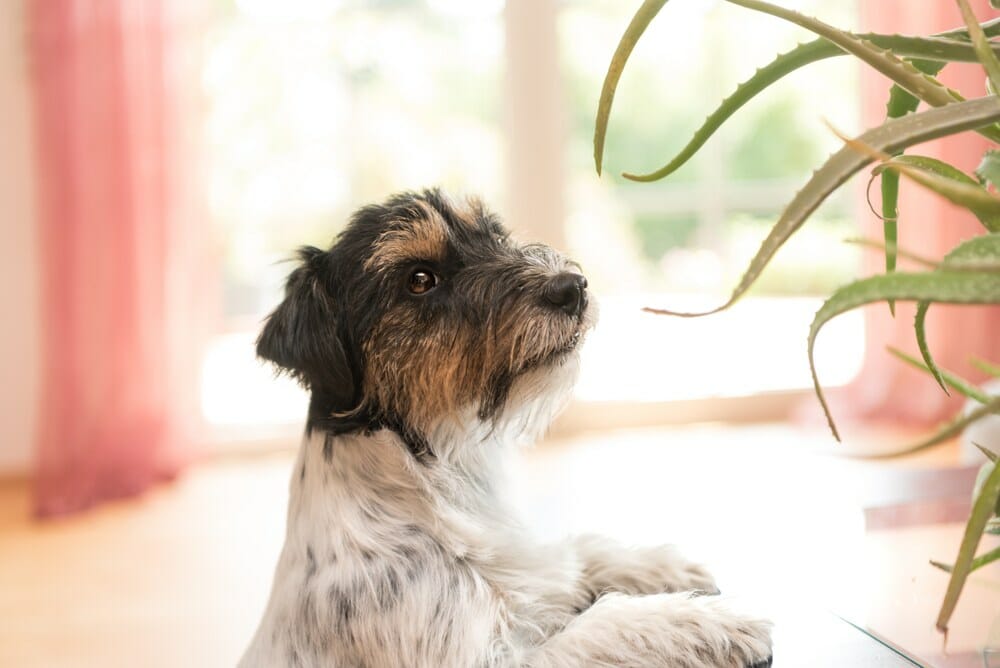
Ensure you only use food-grade gels or juices made from the inner fillet. A ¼ teaspoon per 10lbs of your dog’s body weight should be enough. Avoid the aloe latex if you’re using leaves grown at home or buying them from the store – that’s the yellow substance on the inside of the leaf and is toxic to them.
- Apple cider vinegar – this can help increase contractions inside the colon to move waste out and also help support digestive health as a prebiotic. Just don’t give it straight. Mix it with their food or water.
- The amount of apple cider vinegar to use depends on your dog’s weight. One teaspoon is enough for up to 14lbs, two teaspoons for 15 to 34 lbs, and one tablespoon for 35 to 84 lbs.
- Senna – this can be very effective, but use is only recommended with guidance from a holistic vet to avoid diarrhea caused by improper use.
- Chickweed – this is a very gentle and natural laxative for dogs that will help soothe the digestive tract and lubricate the large intestine. Dilute it in an ounce of water to make it easier to give to your pup.
Most people consider milk a natural laxative for animals, but it often leads to diarrhea and digestive upset, since most are lactose intolerant.
What is a dog constipation remedy?
A dog constipation remedy refers to a long-term solution for persistent or consistent constipation.
It involves keeping your dog’s colon healthy, ensuring they get enough exercise, feeding them a healthy, well-balanced diet, and always providing access to fresh, clean water.
You can also try a low-residue diet as a long-term solution. With this kind of diet, your canine partner digests more nutrients and has less waste to pass into the colon.
It’s often better than a long-term high fiber diet and is only available through veterinarians.

Final Thoughts
There are several reasons why your dog might be constipated. Most of the time might be related to nutrition, but it can also be caused by stress.
If your dog is not expelling feces normally or is not doing it at all for a few straight days, please call your vet immediately. Early diagnosis avoids further complications and professionals will know how to advise you properly.
In case you need to change the diet of your companion, visit Spot & Tango to check for some options. Most of S&T’s recipes are high in fiber and should help your pup feel more comfortable with their digestive system.










